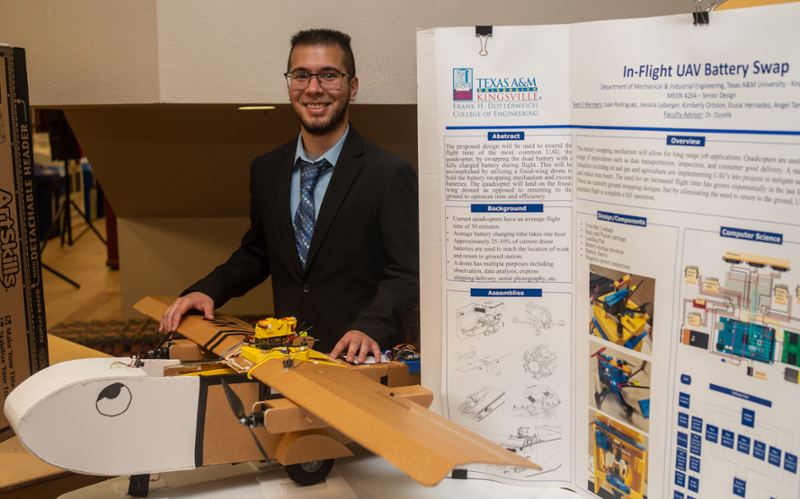The Frank H. Dotterweich College of Engineering held its annual Senior Design Conference on Friday, April 29 at the University’s Engineering Complex.
During the conference, senior engineering students showcased their student capstone projects with judges evaluating the presentations. Dr. Heidi A. Taboada, Dean of the College of Engineering, said 180 students worked for an entire year to complete the 44 projects presented during the event.
“These capstones and design presentations serve two purposes. One, it is a general requirement we have for all engineering majors before graduation and also this is a requirement for ABET accreditation,” Taboada said.
The College of Engineering’s programs in architectural, chemical, civil, electrical, environmental, mechanical and natural gas engineering and computer science are accredited by the Engineering Accreditation Commission (EAC) and by the Computing Accreditation Commission of ABET.
Senior computer science major Alycia Jenkins said her team debuted an app they researched, coded and produced for Animal Rescue Kingsville (ARK). The students worked with ARK to design an app that will meet the group’s needs and allow users to see what rescue animals are available at the shelter, donate and more.
Jenkins said her group used Flutter SDK as a framework for the app, but the design and back-end coding were handled by the team of engineering seniors.
“Users will be able to make appointments with ARK as well as scroll through an Instagram-looking feed where they can swipe through the images, click on profiles of the animals and interact with the animals by liking their photo,” Jenkins said. “That (activity) gets saved to their profile and they will be able to contact ARK and send them messages as well.”
The team hopes to have the app completed and available to launch by Dec. 2022.
Juan Rodriguez and Jose Angel Martinez shared their group’s design for an in-flight unmanned aerial vehicle (UAV) battery swapping system during the conference. They said their system would allow for UAVs to swap their battery systems while in flight, saving costs for companies by lowering the number of units needed to complete a task or allowing them to work for longer lengths of time.
“The goal of this project is to be able to grab a drone out of the air and then swap the batteries in flight,” Rodriguez, a senior mechanical engineering student, said. “That way it won’t have to return all the way home, and that might be like a two- or three-mile journey, so we’re wasting less time traveling instead of getting work done.”
“Just send out a drone, switch the battery and the drone that is working on its project can keep working on said project,” Martinez, a computer science senior, said.
Rodriguez and Martinez added that their team’s project had a 99.2% tested success rate with the 0.8% of failures occurring due to wind or massive alignment issues.
Each of the 44 project teams worked with a faculty advisor to ready their presentations for the conference.
“I want to thank all the faculty that were involved in these presentations, all the lab technicians, all the lab managers. They assisted our students throughout the year,” Taboada said. “This is a great opportunity for our students to showcase all their hard work they have invested in these final senior assignments.”
